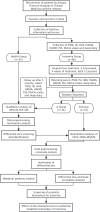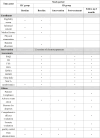Mechanistic study of electroacupuncture in the treatment of insomnia: study protocol for a clinical trial of serum metabolomics based on UPLC-Q/TOF-MS and UPLC-QQQ-MS/MS
- PMID: 40201058
- PMCID: PMC11975891
- DOI: 10.3389/fpsyt.2025.1499361
Mechanistic study of electroacupuncture in the treatment of insomnia: study protocol for a clinical trial of serum metabolomics based on UPLC-Q/TOF-MS and UPLC-QQQ-MS/MS
Abstract
Background: Insomnia is the most prevalent sleep disorder worldwide. Electroacupuncture is effective in improving sleep quality, daytime fatigue status, and anxiety and depression in patients with insomnia, and this study aimed to investigate the metabolic pathways and their possible mechanisms in response to the efficacy of electroacupuncture in the treatment of insomnia.
Methods: A single-center, double-blind, clinical trial was the study's design. For this study, a total of 99 participants were enrolled, and they will be split into two groups: one for insomnia and the other for health. There are 33 healthy people in the healthy group and 66 insomnia patients in the insomnia group. Acupuncture treatment will be administered to the intervention group three times a week for four weeks, for a total of twelve treatments, and will be followed up for 3 months. A combination of UPLC-Q/TOF-MS and UPLC-QQQ-MS/MS was used to qualitatively and quantitatively examine the serum of 99 participants. The Pittsburgh Sleep Quality Index (PSQI) and serum metabolomics provided the primary findings. The Insomnia Severity Index (ISI), Hyperarousal Scale (HAS), Fatigue Feverity Scale (FSS), Hamilton Depression Scale (HAMD), Hamilton Anxiety Scale (HAMA), Sleep Diary and The Montreal Cognitive Assessment (MoCA) were the secondary outcomes. For the insomnia group, serum will be collected at baseline, at the end of treatment, and the scale will be collected at baseline, after 4 weeks of treatment, and at 3 months of follow-up. For the healthy group, serum will be collected at baseline.
Discussion: This study aimed to assess the modulatory effects of electroacupuncture on relevant metabolic markers using serum metabolomics, to explore the potential mechanisms and relevant metabolic pathways of electroacupuncture for the treatment of insomnia, and to provide strong scientific evidence for the treatment of insomnia by electroacupuncture.
Trial registration: ChiCTR2400085660 (China Clinical Trial Registry, http://www.chictr.org.cn, registered on June 14, 2024).
Keywords: clinical trials; electroacupuncture; insomnia; metabolomics; study protocols.
Copyright © 2025 Zhang, Cao, Ye, Dai, Qin, Wang, Wu and Liu.
Conflict of interest statement
The authors declare that the research was conducted in the absence of any commercial or financial relationships that could be construed as a potential conflict of interest.
Figures
References
-
- Chinese Sleep Research Society . Guidelines for the diagnosis and treatment of insomnia in China. Natl Med J China. (2017) 97:1844–56. doi: 10.3760/cma.j.issn.0376-2491.2017.24.002 - DOI
-
- Zhao YH, Luo X. Progress in the study of the epidemiology and pathogenesis of insomnia. Chin J Clin. (2023) 51:1397–401. doi: 10.3969/j.issn.2095-8552.2023.12.004 - DOI
LinkOut - more resources
Full Text Sources




